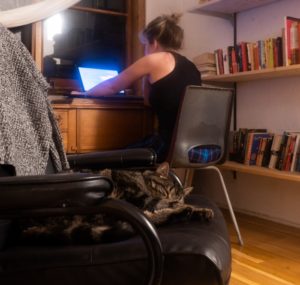One thing we hear constantly over the radio, over the news, through any type of media soundbite that crosses our rather constricted paths this past year is talk of mental health. It’s COVID fatigue—people have been walking the same lines now for a year, whether it be the arrows pointing us down which way to follow the aisles in a grocery store; the two-metre separation mark at the line-ups at Costco or Winners; the waiting one by one in a line-up to go up an elevator… We are all still succumbing to these rules but the layers of strength are starting to wane, and sooner or later, if even more support isn’t offered to students and staff at Camosun (how about support groups for both?), I’m worried that the proverbial student body’s knees will buckle and there may be some real problems to clean up.

COVID fatigue is real, and everybody’s dealing with it, although the courage and tenacity that I see in my fellow beings never ceases to astonish me. Of course, now that we are fighting COVID, the vaccines are delayed, and there are newer and scarier variants of the virus out there. I picture them looking like gremlins, although harder to kill (blender, anyone?). But green COVID monsters aside, what about the real sadness that is going to happen and how do we cope when we don’t have our campus and classmates to offer support?
My father died last week. I knew it would happen sometime soon, but I didn’t have my campus to go to, my campus where being able to carry on and breathe the air while walking up the stairs to the Young Building would be incredibly cathartic. I couldn’t go to my prof’s office and tell them the reason I fell asleep at the beginning of class was because I was grieving; I can’t go to By the Books and not even have to say anything to my favourite barista because she would have seen it in my eyes that something terrible was wrong. We are all going to go through these personal tragedies, and now it feels like we are going through them on our own. We have none of our old ways of seeking support, and it feels inadequate; empty. Our bubbles are lonely and not full of the kind of support we would find if campus were open.
We have to be stronger on our own, moreso than we ever have before. We still have virtual connection with our fellow students, but that isn’t the same as a group of friends surrounding you when you are hurting. All we can do is just seek support with what we have, turn in our work on time, and know that someday we will be telling this story to someone else.

Dear Emmy, thanks for sending me this emotionally complex and heartfelt piece. In sad times we need the comfort of others, however Covid informed living conditions have, now robbed you of that support. I feel for you, and wish I could be there to give you a big hug. Please know it is now a virtual one. Keep keeping in touch. I am here for you, Vicki
You have expressed very well what many of us are feeling, Emily. By doing so, you have made some of us feel less alone, hopefully the satisfactions of the craft of writing, together with the well-intentioned feedback we send you, will help you in some small way also.
I am so glad that what I wrote was able to reach you. We are all trying to manage through trying times, and writing, for me, is a way to express, manage, cope, and grieve, so when I hear I was able to get to someone else, it helps me too!
Thank you for writing this. Fatigue indeed!
In my experience, I miss the normalcy and environment of a classroom. There was something about being face to face in class that kept me focused and engaged. Now, being at home with others in the house, it’s so easy to be distracted. Even with my attempts to use headphones, turn my phone on silent and ask my partner to give me quiet… it’s still difficult. I appreciate your comment about mental health. Covid fatigue is real, for sure. For me, it seems even small stressors test me more than before covid(I can’t imagine going through grief through this… I’m so sorry). Anyway, thanks for the article. Your words speak to me. ❤️?